Most octopuses lead solitary lives. So scientists were startled to find thousands of octopus huddled together, protecting their eggs at the bottom of the ocean off the central California coast.
Now researchers may have solved the mystery of why these pearl octopus congregate: Heat seeping up from the base of an extinct underwater volcano helps their eggs hatch faster.
 Full Story
Full Story
The destructive power of wildfire has been a defining feature of a summer of climate extremes.
Dozens of people on multiple continents have died. Blazes have reduced homes and businesses to rubble. Thick smoke has darkened skies and carried fine-particle pollution thousands of miles from its source.
 Full Story
Full Story
Rescuers have evacuated more than 100,000 people from flood-hit areas of Pakistan's eastern Punjab province in the past three weeks, officials said Wednesday.
The rescue operations were expanded last week when the Sutlej River started overflowing, inundating several districts. Most of the evacuations were reported in the districts of Bahawalpur and Kasur in Punjab province.
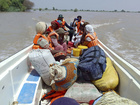 Full Story
Full Story
Water-dropping planes from several European countries joined hundreds of firefighters Wednesday battling wildfires raging for days across Greece that left 20 people dead, while major blazes also burned in Spain's Tenerife in the Canary Islands and in northwestern Turkey near the Greek border.
Greece's largest current forest fire was burning out of control for the fifth day near the city of Alexandroupolis in the country's northeast, while another major blaze on the northwestern fringe of Athens was burning homes and heading towards the Parnitha national park, one of the last green areas near the Greek capital.
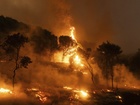 Full Story
Full Story
A natural El Nino, human-caused climate change, a stubborn heat dome over the nation's midsection and other factors cooked up Tropical Storm Hilary's record-breaking slosh into California and Nevada, scientists figure.
Cooked up is the key phrase, since hot water and hot air were crucial in rapidly growing Hilary and then steering the storm on an unusual path that dumped 10 months of rain in a single weekend in normally bone-dry places. Nearly a foot of rain fell in parts of Southern California's mountains, while cities smashed summertime records.
 Full Story
Full Story
The Swiss weather service said Monday a heat wave has driven the zero-degree Celsius level to its highest altitude since recordings on it in Switzerland began nearly 70 years ago, an ominous new sign for the country's vaunted glaciers.
MeteoSwiss says the zero-degree isotherm level reached 5,298 meters (17,381 feet) above sea level over Switzerland overnight Sunday to Monday. All of Switzerland's snow-capped Alpine peaks — the highest being the 4,634-meter (15,203-foot) Monte Rosa summit — had air temperatures over zero Celsius (32 F) where water freezes to ice, raising prospects of a thaw.
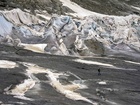 Full Story
Full Story
Hundreds of firefighters struggled Tuesday to control major wildfires burning out of control for days in northeastern Greece and on Tenerife in Spain's Canary Islands, with strong winds fanning the flames and prompting evacuations of villages and a city hospital in Greece.
Hot, dry and windy conditions have seen dozens of wildfires break out across Greece, with the most severe entering its fourth day and encroaching on the northeastern port city of Alexandroupolis. On Monday, two people died and two firefighters were injured in separate fires in northern and central Greece.
 Full Story
Full Story
Major wildfires were burning in Greece and on one of Spain's Canary Islands off the northwest coast of Africa Monday, with hot, dry and windy conditions hampering the efforts of hundreds of firefighters battling the blazes, two of which have been burning for several days.
European Union officials have blamed climate change for the increasing frequency and intensity of wildfires in Europe, noting that 2022 was the second-worst year for wildfire damage on record after 2017.
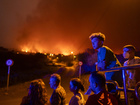 Full Story
Full Story
Tropical Storm Hilary inundated streets across Mexico's arid Baja California Peninsula with deadly floodwaters Sunday before moving over Southern California, where it swamped roads and downed trees, as concerns mounted that flash floods could strike in places as far north as Idaho.
Forecasters said Hilary was the first tropical storm to hit Southern California in 84 years, bringing floods, mudslides, high winds, power outages and the potential for isolated tornadoes. The storm already dumped more than 6 inches (15.24 centimeters) of rain in some mountain communities and threatened more than an average year's worth of rain in inland desert areas.
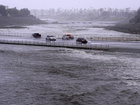 Full Story
Full Story
A new study reveals that 25 countries, home to a quarter of the world's population, are facing extremely high water stress. Most are located in the Middle East, South Asia and Africa.
Repeated droughts around the world are depleting water tables and leading to water stress, in other words, demand for water is outstripping available resources. And the situation is not about to improve. By 2050, almost 60% of the world's population could be facing extremely high water stress for at least one month of the year. Such are the alarming findings of the World Resources Institute (WRI), which recently published data from its Aqueduct Water Risk Atlas, detailing the countries most at risk of water shortages. It names the five most water-stressed countries as Bahrain, Cyprus, Kuwait, Lebanon and Oman. "The water stress in these countries is mostly driven by low supply, paired with demand from domestic, agricultural and industrial use," the WRI notes.
 Full Story
Full Story



